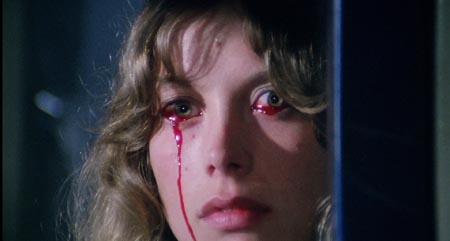DIRECTED BY: Lucio Fulci
FEATURING: Christopher George, Catriona MacColl (as Katriona MacColl), Carlo de Mejo
PLOT:The suicide of a priest prompts the Hell Gate in Dunwich, NY to spring open, bringing with it maggot storms and risen dead.

WHY IT WON’T MAKE THE LIST: This pastiche of zombies and Lovecraftian references does have a couple of neat-o violent set pieces, but is largely a tedious, incoherent affair.
COMMENTS: Throughout City of the Living Dead, you cannot help but think of prior, superior entries in the zombie genre. A woman’s scream sounds over a black screen, then there’s an opening shot of a church steeple with a backwards tracking shot showing the adjacent cemetery. The close-up a gravestone reads: “The soul that pines for eternity shall out span death. You dweller of the twilight void, come. Dunwich.” This helpfully informs the viewer of the movie’s two main ingredients: undead and ill-defined Lovecraftisms. We see a priest hang himself from a tree, the base of the rope attached to an obelisk (Masons?) Within moments of the cutback to New York City we find a young psychic and her mentor, with the former literally frightened to death (Poe?) and the latter going on about the merits of the Book of Enoch.
Unfortunately, so little goes right in this movie that it is difficult to discuss without sounding like a long list of complaints. To its credit, the pacing is brisk enough that its ninety-three minutes go by swiftly. An intrepid journalist is curious about the psychic’s mysterious death, and in the course of poking around the cemetery she’s to be laid to rest in, he even saves her from being buried alive (Poe, again). With her in tow, and receiving further advice from the Book of Enoch, they make their way to the cursed town of Dunwich in order to close the opened gate to hell before All Soul’s Day.
Taking place between the priest’s suicide and the nebulous finale is a string of poorly coordinated horror-movie moments. There’s a young village-idiot type who may or may not have supernatural powers (at the very least he can inflate a blow-up sex doll without a bicycle pump) who meets a rather grim (and, film-wise, notorious) fate at the hands of an over-protective father. There’s Dunwich’s resident psychologist who is either calm beyond belief in the face of unremitting supernatural tragedy or just bored out of his mind. And there’s my favorite diversion in this trip to mid-state (?) New York—two barflies and the saloon keeper having their own Xanaxed discussions about the slowly growing zombie menace.
Amidst all the Lovecraft, ancient Judaica, and Poe, there’s also, perhaps, a Conan Doyle hat-tip with the unlikely named mortician’s, “Moriarty and Sons.” Granted, this isn’t an altogether impossible name for an establishment, as it is not too uncommon an Irish name, but with all the other shout-outs to superior fiction, I’m inclined to believe the director deliberately went for it as a recognizable link to Holmes’ diabolical nemesis. Among the many real pities about this movie is the fact that none of these potentially worthwhile homages are given any narrative traction. Taken together, they seem more of a “Hail Mary” on the part of the film makers to lend their movie a smattering of depth as opposed to any actual link (either thematic or otherwise).
The horror scenes themselves aren’t that weird (rotting corpses, vomited innards, plague of maggots), and that results in the only truly weird moments in the movie being the strange relics of the era in which it was written. There’s a scene with the two cemetery men who don’t quite bury the heroine during which one of them (the one with the mustache, of course) is ogling an adult men’s magazine. He quips to his buddy, “Talk about ‘box lunches’, man!” as he gazes over the pictures. In contrast to this dismissive chauvinism is the enlightened exchange between the psychologist and a patient of his that goes as follows:
“Tell me honestly, do you consider me a basket case?”
“No, you’re nurturing a pet neurosis, that’s all, just like about 70% of the female population of this country.”
“So according to you, I’m not stark raving mad…”
This exchange is made without any sense of irony, which brings me to my main reaction to this whole movie: had it been made within the past decade or so, City of the Living Dead could easily pass as a humorous post-modern take on the whole genre of low-budget horror movies from the ’70s and ’80s. However, that is not the case; everything is to be taken at face value. Fulci obviously intended this as a sincere entry into the zombie canon, but succeeded no more than Ed Wood succeeded in his efforts to make a science fiction masterpiece.
WHAT THE CRITICS SAY: